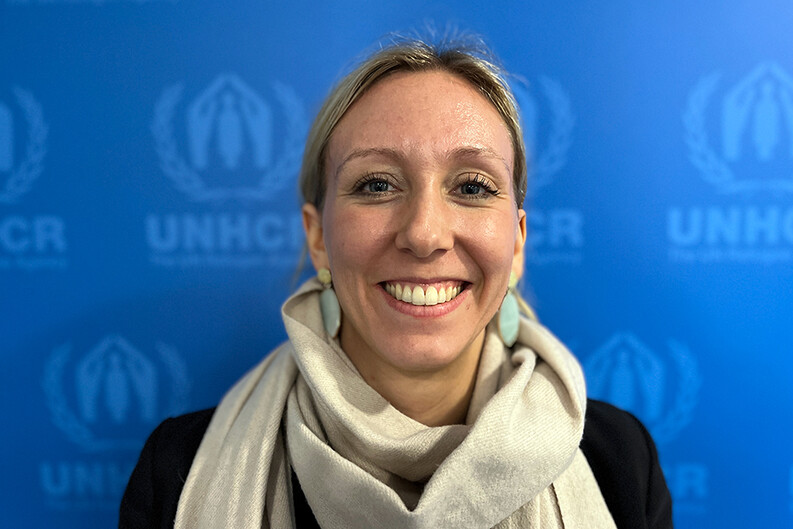Schell Center Postgraduate Fellow Spotlight: Robina Fellow Lena Riemer ’22

Lena Riemer ’22 discusses her time as a Robina International Human Rights Fellow4 in Berlin, Germany, at the United Nations High Commissioner for Refugees (UNHCR), the U.N.’s refugee agency.
Supported by the Robina Foundation and administered by the Orville H. Schell, Jr. Center for International Human Rights5 at Yale Law School, Robina Fellowships allow recent graduates of the Law School to gain experience in international and foreign courts and other international institutions that address the promotion and protection of human rights or to carry out independent human rights research.
How long have you worked as a Robina Fellow and at the United Nations High Commissioner for Refugees (UNHCR) in Berlin, Germany?
I started in September 2022 and have been working as a Robina Fellow for about six months.
What does your work at the UNHCR entail?
My main project is a comparative analysis of state practices concerning the (non) issuance of identification documents to refugees and migrants, what this means for those affected, and how certain policies could be changed. Besides that, I am fortunate to be part of the small UNHCR Berlin team (14 people) and participate in the team’s everyday work at the intersection between law and policy. This ranges from assessing and commenting on legislative proposals, doing legal research, advising clients seeking assistance in our office, and participating in team meetings.
So far, one of my highlights of my time as a Robina Fellow was meeting the U.N. High Commissioner for Refugees, Filippo Grandi. He visited our office, and during a brown bag lunch, he offered interesting insights into his work and vision while giving us room to report about our work.
Describe a project you’ve worked on.
The lengthy title of my project is “Giving Practical Effect to Refugees’ Rights to Equal Participation In Their Country Of Asylum — Advocating For Administrative Assistance For Identity Document Acquisition.” What this means in concrete terms is that thousands of refugees and migrants in Germany who are unable to prove their identity with a valid passport face significant legal and practical hurdles in their everyday life, from receiving birth certificates for their children to getting married, obtaining property, or naturalizing.
I am looking at law and practice in Germany and beyond to determine where legislative and practical adjustments are necessary, collect best practices, and talk to researchers and practitioners to develop concrete policy suggestions for adjustments in administrative assistance. For example, I am currently looking at the birth registration and naturalization process in Sweden, the U.K., and the U.S.A. to find positive examples that could be implemented more broadly.
What have been some of the challenges of your work assessing the legal and practical difficulties refugees face in Germany?
I have faced two main difficulties in my work. The first is in comprehensively assessing the legal and practical difficulties refugees face nationwide. Germany’s federal structure means that in general, the national government is responsible for broader governance issues while the smaller subdivisions, such as states, cities, and communities, are in charge of more regional and local questions. Hence, in practice, a Syrian refugee in Berlin likely faces different hurdles than an Afghan refugee in Munich. This disparity has a lot to do with not only the country of origin of the respective person, but also the concrete practice of the local officials dealing with their claims. This then leads to the subsequent difficulty of determining where to advocate for change effectively. Is training state officials the right approach, or do we need guidance from the ministry level or even a legislative adjustment? In the past six months, I learned that advocating for such change with different actors and on various levels may take years or even decades. This lesson was very helpful for my current and future work in this area.
What experiences motivated you to pursue this opportunity?
For many years, I have been volunteering, researching, teaching, and working in the field of migration and refugee law in Germany and abroad. Volunteering with the Yale Asylum Seeker Advocacy Project in 2019 at a family immigration detention center was pivotal in my career choice. I felt that something fundamental needed to change in immigration laws and practices around the globe, and I saw advocacy and policy as a means to do so.
I have worked for UNHCR previously. However, I worked more on monitoring, which differs from my current role. I wanted to return to the organization to continue contributing to its advocacy work and expanding my skills in Berlin.
What do you hope to gain from this fellowship experience?
One of my main reasons for applying for the fellowship with UNHCR Berlin was to get further insight into the policy and advocacy world. Questions like how do you strategically advocate for legislative change, which tools do you use, and which actors do you address led me to my current project. Fortunately, I work with colleagues who often have more than a decade of experience in that area and include me in their work, providing me with invaluable insights. I hope to gain even more insights in the next six months and apply them to my own research project.
Is there anything else you would like to share?
The Robina Fellowship is much more than a unique opportunity to learn new skills, work on interesting projects that are close to one’s heart, and gain important work experience. It is also a network of like-minded and like-hearted people one can rely on for advice and exchange, including alumni, current fellows, and the Schell Center team. The annual Bernstein Symposium6 in April brings all of them together in New Haven for three days of exchange, discussion, and networking. I am very much looking forward to this event next month!


